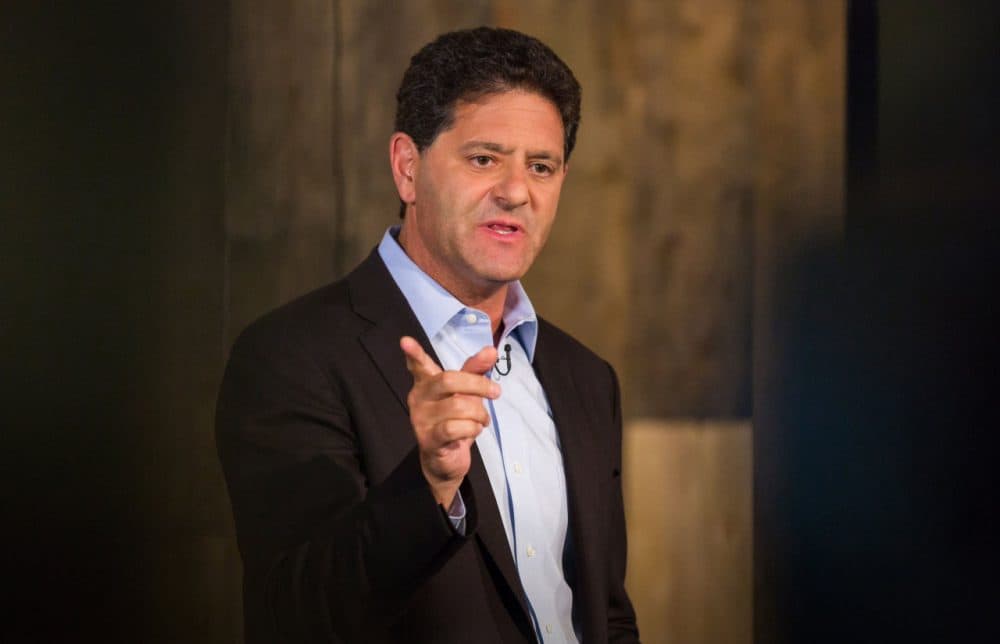Advertisement
The Super-Wealthy VC Behind The Fight For A $15 Minimum Wage
Resume
A few years ago, the fight for raising the minimum wage to $15 an hour may have felt impossible, but after years of organized protests and campaigns, the movement has made progress.
Last year, a small handful of states and cities began taking steps to phase in the wage hike and this year, there may be more changes in at least five states and nine cities.
Nick Hanauer is one of the people behind the movement. As a well-known technology entrepreneur and venture capitalist with several yachts, vacation homes and a private jet, he is, notably, not making minimum wage, but he believes that a higher minimum would be good business for him, and, according to Hanauer, the right moral choice.
He joins Here & Now's Robin Young to share his perspective on the fight for raising the minimum wage.
Interview Highlights: Nick Hanauer
On his successes
“I grew up in a family business but started starting other companies when I was super young, maybe in my early twenties. And today, I think I’ve helped found, or start, or run, or finance I think 35 companies across a really broad range of industries. But the really big money that I’ve made came from technology and the Internet in particular. I was the first non-family investor in Amazon.com and I made obviously a lot of money on that but I also founded another company called aQuantive, which turned into basically the biggest Internet advertising company in the world, and we sold that to Microsoft for $6.5 billion in 2007.”
On his reasons for supporting a $15 minimum wage
“The fundamental law of capitalism is that when workers have more money, businesses have more customers and need more workers. Prosperity in a technological market economy like ours is a consequence of a feedback loop between increasing amounts of demand and increasing amounts of innovation. The more money workers have to spend, the more incentive there is for entrepreneurs and investors to create new products and services that can increase our standard of living.”
On the feasibility of applying a $15 minimum wage across all of the states
“In every corner of the country in the face of increasing minimum wages, whether it’s 50 cents or 5 dollars, businesses claim the same thing: that they’ll go out of business, that they’ll have to shed workers and so on and so forth. It was no different here in Seattle. It just turns out that it is in actuality not true. As workers’ wages are raised across the border, that increases demand, which benefits businesses. It is ludicrous to expect the minimum wage in a place like New York City to be the same as a small town in a Mississippi. Fifteen has become a bit of a metaphor and what it means is a floor wage which pays people enough in their community for them not to need food stamps and Medicaid and rent assistance and public assistance if they work full time.”
Why he’s so involved in this issue
“If you’ve run 35 different kinds of companies, I think you have a very unusual perspective on how capitalism and market economies work. I’m a capitalist. I want the most robust economy that I can find because that’s where the biggest opportunities for people like me lie. You can’t have a jet unless you have a giant market to sell into. The simple truth is that the better off the typical person is in our country, the better off I will be in the long term in every single way, to say nothing of the moral issues, which are quite obvious. Apple computer is an American company because it is the best place on planet earth to sell to.”
Whether people are justified in being wary about his influence in politics
“I’ve no good answer to that a question. It’s a fair point. Nobody is a bigger advocate of getting money out of politics than me and yet I spend ginormous amounts of money on politics. What does that make me? A hypocrite I guess. I don’t know what to say other than to say I think a distinction can be drawn between the people who pour energy and money into policies that benefit other people directly and not themselves, and people who pour energy and money into policies that only are focused on their narrow, near-term economic self-interest. Trickle-down economics, the idea that the richer the rich get, the better off everyone else will be is a scam. It’s a magic trick. It’s an intimidation tactic masquerading as an economic theory.”
Guest
- Nick Hanauer, entrepreneur and venture capitalist based in Seattle, Wash. He tweets @NickHanauer.
This segment aired on February 2, 2016.